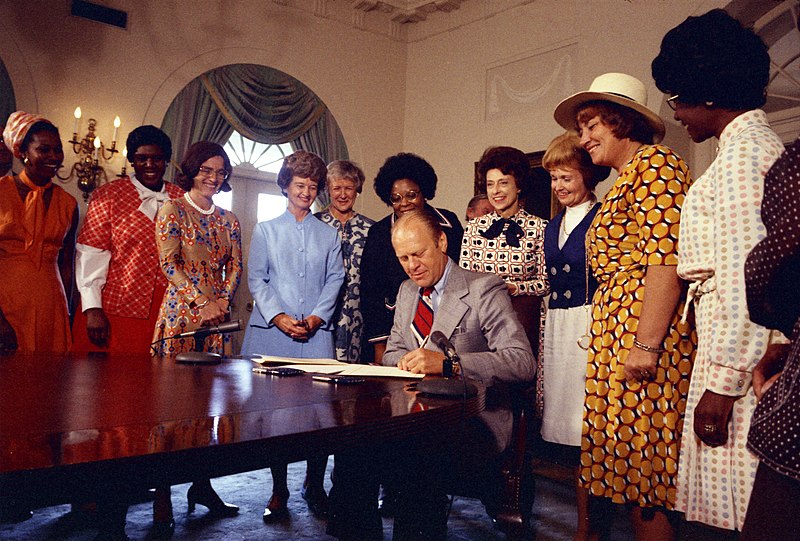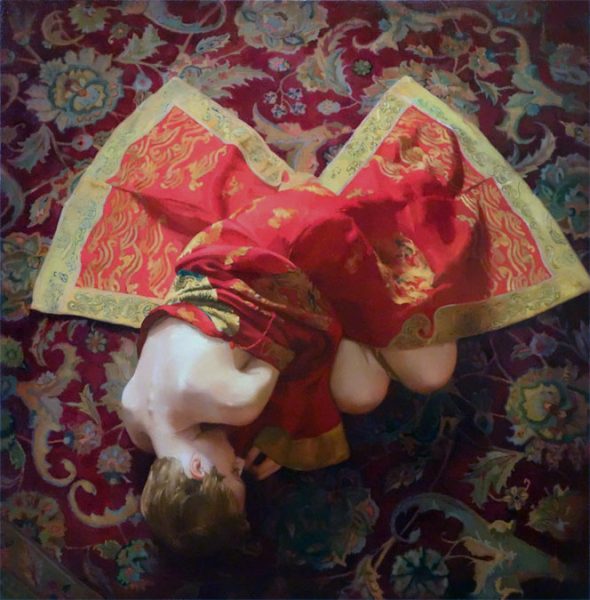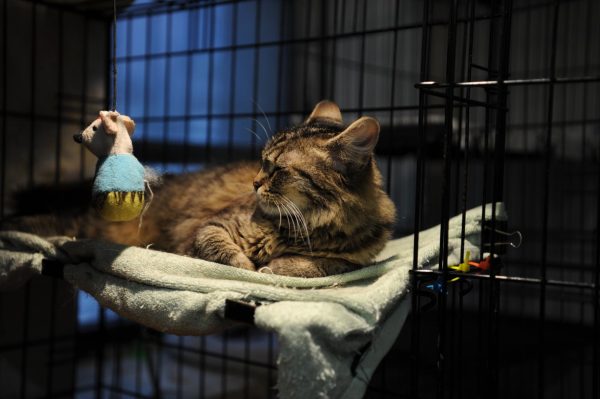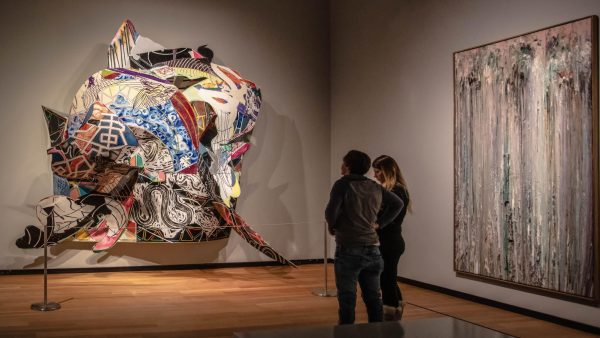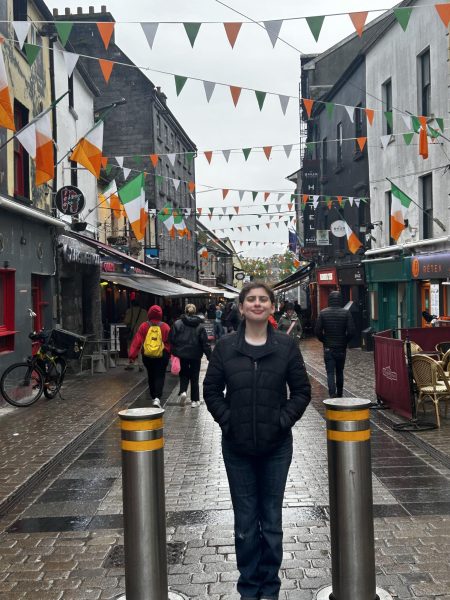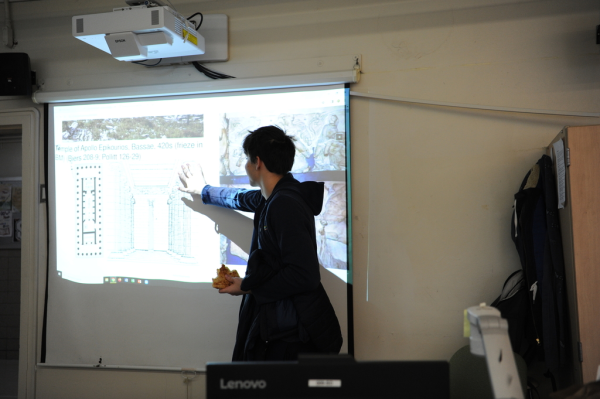“This Woman’s Place is in the House — The House of Representatives”: A Profile on Bella Abzug, From “Battling Bella” to America’s Sweetheart
A pioneer in feminist history, Representative Bella Abzug, was a lawyer, politician, social activist, and leader in women’s rights.
National Archives and Records Administration, Public domain, via Wikimedia Commons
Representative Bella Abzug (D-NY) proudly looks over President Gerald R. Ford’s shoulder as he signs the Proclamation on Women’s Equality Day, along with fellow Representatives Yvonne Brathwait Burke (D-CA), Barbara Jordan (D-TX), Elizabeth Holtzman (D-NY), Marjorie S. Holt (R-MD), Leonor K. Sullivan (D-MO), Cardiss Collins (D-IL), Corinne C. Boggs (D-LA), Margaret M. Heckler (R-MA), and Shirley Chisholm (D-NY).
A formidable champion of gender minority rights, Bella Abzug gained notoriety as one of the most progressive and active House Members during the 1970s. Once quoted as saying “women have been trained to talk softly and carry a lipstick”— a play on Theodore Roosevelt’s famous declaration that on foreign policy, America “should speak softly and carry a big stick”—the determined New York Congresswoman spent much of her life challenging the notion that women should remain on the political sidelines. Abzug’s political flair and unwavering determination inspired generations of women, creating a new model for future Congresswomen.
Born Bella Savitzky on July 24th, 1920 to parents Esther and Emanuel Savitzky, Abzug was a steadfast young girl, dedicated in her pursuit of gender equality. She was fond of her borough of The Bronx, New York, and graduated from Walton High School, where she was class president. In college, she majored in political science at Hunter College of the City University of New York, and she simultaneously attended the Jewish Theological Seminary of America. She went on to earn her law degree from Columbia University in 1947. Abzug had applied to Harvard Law School, but she was rejected because of her gender. This injustice would later serve as the inspiration for her gender equity advocacy.
After graduating from Columbia University’s Law School, Abzug worked as a lawyer for several years, at a time when very few women practiced law. She started at the firm of Pressman, Witt & Cammer, working on labor law, eventually moving on to tackling civil rights cases.
It was at this time that Abzug began to don her distinctive hats which would later become her symbol. I had the pleasure of speaking with Liz Abzug, Bella Abzug’s daughter who explained to me the story behind her mother’s hats. Oftentimes when Abzug introduced herself to law firms, receptionists and other attorneys would assume that she was a secretary and not the lawyer representing the client.
Frustrated by the frequent misunderstandings, Abzug voiced her dilemmas to her husband who suggested finding a way to distinguish herself from the crowd. At the time, women of distinction, such as Eleanor Roosevelt, wore hats and gloves to differentiate themselves. Inspired by this look, Bella Abzug donned her very first hat which she has been affiliated with ever since.
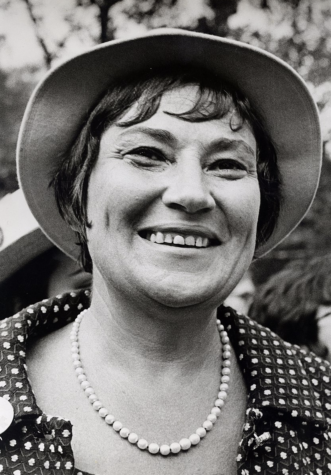
Yet, Liz Abzug recalled, “It wasn’t just the beauty of her hats or the great hat she was wearing. It was what was under the hat that counted.”
While working for the American Civil Liberties Union (ACLU), she took on the case of Willie McGee. McGee, an African American man, was convicted of raping a white woman in Mississippi. He was sentenced to death for this crime, yet many were not convinced of his guilt. Despite facing numerous threats from white supremacists for her involvement in the case, Abzug managed to get his death sentence delayed by appealing his conviction. Unfortunately, Abzug lost the appeal and McGee was executed by the state.
Despite the failure of her previous case, Abzug continued to work for the ACLU, fighting for the rights of minority and disadvantaged citizens, and was an early participant in the Women Strike for Peace (WSP), chairing the organization from 1961 to 1970. Her radical political stances placed her on the infamous master list of Nixon political opponents. During the McCarthy era, she was one of the few attorneys willing to openly combat the House Un-American Activities Committee, which investigated alleged disloyalty and rebel activities on the part of private citizens, public employees, and organizations suspected of having Communist ties.
To promote women’s issues and to lobby for reform, she helped establish the National Women’s Political Caucus (NWPC) with leading feminists Betty Friedan, Gloria Steinem, Patsy Mink, and Shirley Chisolm. The NWPC was an astounding success. During the 1972 national presidential conventions, the number of Republican female delegates doubled, and the number of Democratic female delegates tripled. That same year, a record number of women ran for Congress.
Hoping to further her voice in the political sphere, in 1970, Abzug ran for a Congressional seat, representing New York City’s 19th District, which consisted of Manhattan’s West and Lower East Side. Challenging the 18-year incumbent Leonard Farbstein in the Democratic Party’s primary election, she ultimately secured a victory and went on to defeat talk-show host Barry Farber in the general election.
On her very first day, she set the precedent for her future as one of the boldest and most iconic House members. Continuing her previous advocacy opposing the Vietnam War, Abzug introduced a bill to remove all U.S. troops from Vietnam. Although the legislation did not pass, the bill was simply the first of various efforts by Abzug to advance the causes she believed in. During her tenure, Abzug helped to bring billions of dollars in public works and transportation funding to both New York City and New York State and co-authored several historic bills, including Title IX, a bill prohibiting sex discrimination in educational opportunities by schools receiving Federal funding assistance, the Freedom of Information Act, and the first law banning discrimination against women in obtaining credit.
However, when her district was eliminated due to redistricting in 1972, a determined Abzug chose to run against William Fitts Ryan, who also represented part of the West Side, in the Democratic primary. Despite Ryan defeating Abzug, he died of throat cancer before the general election, and Abzug defeated his widow, Priscilla Ryan, in a party convention to choose the new Democratic nominee. Successfully securing the Democratic nomination, she decisively won the general election and was reelected in 1974.
When asked to best encapsulate her mother in two words, Liz Abzug dedicated the words “magnificently courageous.” She thoughtfully articulated that to her, “The magnificence of a person or of a thing is all encompassing and is so impactful and is so unusually shining and out there yet with enormous reach.” She fondly recalled her mother’s brave spirit in face of immense adversities and challenges from her peers and society.
Abzug became famous, and oftentimes criticized, for her outspoken nature on social justice issues. She fought tirelessly for women’s rights and for people’s civil rights. In 1975, Abzug made history when she introduced the first gay rights bill in Congress, known as the Equality Act of 1974, with fellow Democratic New York City representative, Ed Koch, future mayor of New York City. She also chaired historic hearings on government secrecy, and headed the Subcommittee on Government Information and Individual Rights. Her relentless drive and dramatic personality made her colleagues vote for her as the third most influential member of the House at the time.
Liz Abzug noted, “She had a very special way to analyze and put things together which is why she was so precedent-setting. She could see things way ahead of other people because she could put things together on a conceptual level that a lot of people can’t do.” She reflected that it was her mother’s distinctive intellect that made her a proponent of so many progressive legislations.
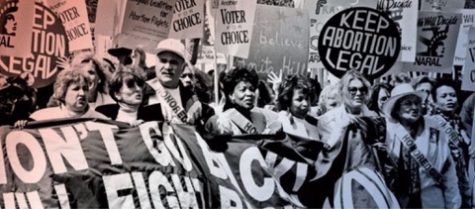
Following three terms in the House of Representatives, Abzug gave up her seat in 1976 to run for an all male Senate. She suffered a heartbreaking defeat to Daniel Patrick Moynihan, losing by a margin of less than one percent. After leaving the House in 1977, Abzug also made a bid for mayor of New York City, but lost to Ed Koch in the primaries.
With her career in Congress over, President Jimmy Carter appointed Abzug to head the new National Advisory Committee for Women in 1978. She presided over the first National Conference on Women in Houston in 1977, where 2,000 elected delegates from every state and territory in the U.S. and 18,000 observers attended and developed a precedent-setting National Platform of Action for women. However, Abzug was abruptly fired from her short tenure for criticizing the Carter administration’s economic policies in 1979. She condemned Carter’s anti-inflation program, which proposed cutbacks in welfare programs while drastically increasing the military budget, abhorring the decrease in government aid to needy citizens.
In response, Bella Abzug founded Women USA, a grassroots political action organization, and continued to lead feminist advocacy events. Despite her political setbacks, she continued to be a relentless advocate for gender minority rights, using her tactical brilliance, wit, and charisma to further her causes.
During this time, Abzug also successfully wrote two books, Bella!: Ms.Abzug Goes to Washington and The Gender Gap, the latter co-authored with friend and colleague, Mim Kelber. An open-minded individual, Abzug continually devised innovative strategies to further her vision of equality and power for women in the United States and abroad.
In the early 1990’s, Bella Abzug co-founded the Women’s Environment and Development Organization (WEDO), one of the largest international non-governmental activist organizations. Through this nonprofit, Abzug continued her work to achieve full economic rights and equal representation for women. She continued to expand her work at the United Nations, developing the Women’s Caucus, which analyzed documents, proposed gender-sensitive policies and language, and lobbied to advance the Women’s Agenda for the 21st Century at the 1992 UN Conference on Environment and Development in Rio de Janeiro.
Even during her last years, Abzug kept up her busy schedule of travel and work, despite having to travel in a wheelchair. She led WEDO until her death, giving her final public speech before the United Nations in March of 1998. A year before her death, Abzug received the highest civilian honor at the United Nations, the Blue Beret Peacekeepers Award. After battling breast cancer for numerous years, she developed heart disease and died at the age of 77 on March 31st, 1998, due to complications following open heart surgery.
As a result of her groundbreaking campaigns, Abzug is often credited with paving the way for women aspiring to higher levels of office and opening doors for generations of women leaders in politics and government. Her memory lives on through the inspiration she provides millions of aspiring young women in the political sphere and through her children Eve and Liz Abzug.
Liz Abzug reflected that her childhood was not the easiest growing up in her mother’s limelight. She recalled, “We often took some ridicule for our mother’s work. When my mother first got elected, people would ask my father if he would wear the apron in the house.” Despite her father dismissing such comments, various people would continue to criticize the family for their progressive outlooks on life. She furthered, “When you are the daughter or son of a famous person who is as exposed and present in the media as my mother was, your life is also exposed to a certain degree.”
Regardless of such challenges, Liz Abzug concluded that her childhood was a worthy experience. Despite numerous ups and downs, her mother’s love offered a fierce and firm source of encouragement and support. She remembered her fondest memory as a child was her mother’s heroic rescue of her while the two were horseback riding. Her mother was an avid horseback rider and frequented stables in Upper West Harlem and upstate New York for weekend getaways. On one of these occasions, a five year old Liz Abzug donned a professional race horse which immediately took off galloping towards a hill. As she held on for dear life, she could barely remain in her saddle due to the horse’s speed.
She recalled, “And I was holding on, I was thinking, ‘I’m going to fall off this horse.’ All of a sudden, my mother came from behind and somehow galloped up next to me and held my collar and swept me off that horse and onto her own.” This moment cemented the elder Abzug as a mythical “Annie Oakley or a wild western woman” in the eyes of the younger. She recalled that it was a major ordeal as a child and the source of frequent inspiration for her academic writings. It created a bond unlike no other between the two.
It was this intense and loving bond combined with her own social justice work that inspired Liz Abzug to create the Bella Abzug Leadership Institute (BALI) in memory of her mother. Created in 2005, the organization is, in Liz Abzug’s words, “a living legacy to her [Bella Abzug’s] work and a way to carry on the unfinished business for young women and men. To make it so that they feel empowered to seize the reins of leadership in the tradition of Bella being so courageous, dynamic, and powerful.”
Over the years, the organization has trained over four thousand young gender minorities, transforming them into leaders and activists ready to change the world for the better. BALI curriculum is created to benefit all youth in underserved communities throughout New York City and around the country, mentoring them in developing leadership skills and public speaking. Bella Abzug’s memory lives on through the extraordinary impact the program has had on thousands of its trainees.
Bella Abzug’s legacy is one of perseverance, determination, and relentless courage in the face of some of the world’s greatest challenges. Despite being discriminated against due to her gender and beliefs, Abzug secured one of the greatest political legacies in American history, serving as an inspiration for generations of young adults.
Liz Abzug noted, “She had a very special way to analyze and put things together which is why she was so precedent-setting. She could see things way ahead of other people because she could put things together on a conceptual level that a lot of people can’t do.”
Pritika Patel is an Editor-in-Chief for ‘The Science Survey.’ She believes that journalism serves as the vital connection between people and the world...

